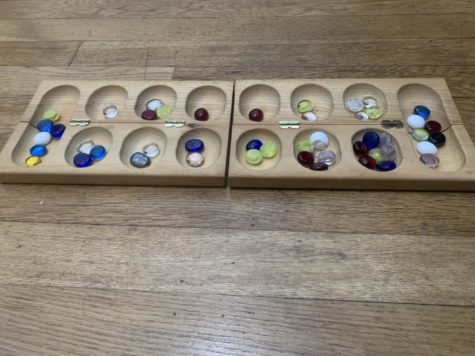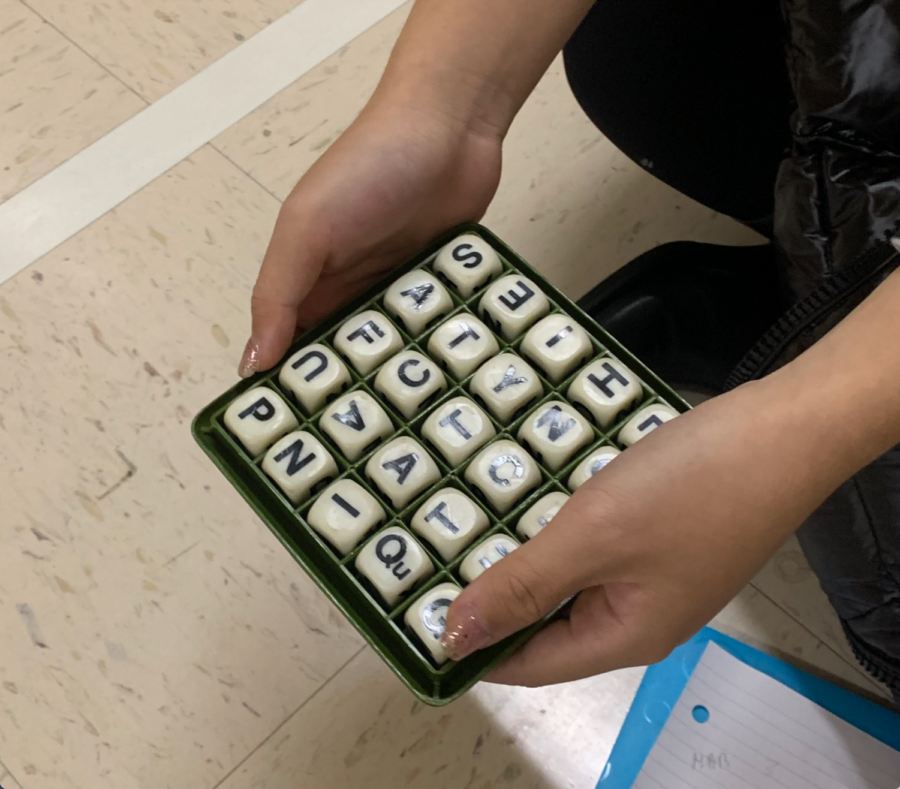Work Hard, Play Hard: The Benefits of Playtime
‘All work and no play’ makes for unhappy students.
This board is used to play Boggle, a word game similar to Word Hunt on Game Pigeon. My friends and I will occasionally stay after school to play and destress after a long week of testing.
Time is of the essence. In a typical school week, Bronx Science students cycle through a dizzying array of courses and extracurriculars, leaving many feeling as though they barely have time to catch their breath before the next week rolls around. Thoughts of recreational games fall by the wayside — after all, with such a busy schedule, why waste precious time on games?
While there are a few varying definitions of what constitutes “play,” the consensus is that it must be done voluntarily for personal enjoyment and that it must be a deviation from normal life. In Homo Ludens: A Study of the Play-Element in Culture by Johan Huizinga, it is described as “a stepping out of ‘real’ life into a temporary sphere of activity with a disposition all of its own.”
Similarly, play expert and toy designer Yesim Kunter said, “Being happy, relaxed, free, feeling like time is flowing, not constantly checking your watch — those things signify that you are in play mode.”
Whether it is sports, video games, or simple activities with friends and family, time spent playing games has been shown to be crucial for child development. Depending on the game, playtime can give children the opportunity to develop their creativity, problem-solving, and social skills. Because of this, play is even acknowledged by the United Nations High Commission for Human Rights as a right for all children.
However, as we grow older, the amount of time people delegate to play decreases. In many instances, this comes as a direct result of an increase in responsibilities associated with growing up.
When I entered high school, I found it more difficult to set aside time to relax and play as a result of my increased workload. It turns out that I am not alone in this experience. “I very rarely play games now, mostly because I rarely have time. I wish I had more time to play and just have fun,” said Molly Charlton ’25.
Gabriella Zwiebel ’25 echoed this sentiment. “I wish that I played more when I was in middle school and that I had the time now to do so.”
Though playtime is certainly more imperative for elementary-school-aged children to have, it still warrants a slot on the timetables of teenagers and adults alike: regular play has been shown to enrich mental and physical health.
Games that involve physical activity, such as sports, can bolster heart and lung health, lowering the risk of heart disease, stroke, and hypertension. “Games such as Just Dance also help me improve my physical health by engaging me in exercise in a fun way,” said Ella Stanley ’24.
Playtime also improves mental health — it reduces stress and stimulates the mind in a different way than regular work or school does. Many times, play elicits laughter, which prompts the release of endorphins and the increase of dopamine and serotonin levels, both of which boost mood and energy. Better mental health has been shown to improve overall productivity and creativity; playtime gives people the chance to step out of “work mode,” reducing the chance of developing burn-out and allowing them to return to work refreshed.
Playing with others can also provide opportunities to learn about them since games can reveal new sides of people. As noted by Parker Fuld ’25, “Many times, certain character traits are only shown when you are in higher-stress situations.”
Though you probably will never have to leverage an army of unicorns or guess the locations of battleships in your day-to-day life, my friends and I have done so through games in the past. These experiences have highlighted certain characteristics in my perceptions of my friends’ personalities, as well as taught me more about their thought processes.
Earlier this year, I introduced my friends to the game Sungka — a Filipino version of the game mancala — that involves moving clusters of colorful stones around a wooden board with the goal of capturing as many stones as possible. Though I taught them in the same manner, mentioning both times that most of my moves were based on instinct, two of my friends employed disparate playing styles.

One immediately started trying to calculate where each stone would land in an attempt to optimize the length of her turns. The other chose which pile to move based on what stones he thought were prettiest.
Though it would be unwise to judge a person solely on their in-game choices, games do exist in somewhat of a warped reality, in that they have different rules and stakes than those imposed in typical school or work life. While the second friend I mentioned above did not use a mathematical game strategy, he excels at it in school; his way of enjoying the game simply involved not taking it as seriously as he would take a calculus test. Playing with him gave me the opportunity to see how he was without the rigid structures and stakes imposed by classes and projects.
This phenomenon is not limited to friend groups. “One of my favorite bonding activities with my mom, stepdad, and sister is playing and talking about games with them,” said Jaylene Zorrilla ’26. Playing with family offers the chance to engage with each other as equals, allowing both parents and children to form deeper relationships and garner a better understanding of each other beyond family roles.
In addition, recreational games can also connect strangers, providing the opportunity to learn more about the world and others who live in it. “I play a game called Sky: Children of the Light, and I’ve had a nice chat with someone from Japan who recommended going over there,” Zorrilla said.
However, all of these benefits do not erase the root problem: many Bronx Science students feel that they have no time to play and enjoy themselves.
It is to be expected that free time is a commodity within a community of students who curate rigorous schedules with commitments to extracurriculars. Still, with all of the benefits that play offers, it certainly deserves to be incorporated into your life somewhere.
I tend to spend my lunch periods playing games like Palace or Boggle with my friends, occasionally staying after school with them as well. I will sometimes bring in materials for various games, such as the board and stones for Sungka, and play them with my friends during free periods, but other games don’t require anything special that may be easier to set up in school, such as hide and seek or tic-tac-toe.
If you don’t have the luxury of lunch or free periods, or if you don’t see your friends often, there are countless online games that you can play for short periods of time during commutes or between assignments. My friends and I often play rounds of various games on Game Pigeon, an iMessage extension, throughout the day.
It may seem like extra work to try to add playtime to your schedule but ultimately, it may prove beneficial in more ways than one. Remember that above all, playtime is meant to be fun, and only you can decide what that involves for you. You don’t have to love every game, but any time spent in “play mode” can be beneficial. “Even though I don’t enjoy some games, I still enjoy watching my friends play, since I can always see their personality shine through,” said Grace Lin ’23.
At the end of the day, it’s your schedule, and you can allot your time as you wish. If you’re perfectly content with the daily hustle, then keep at it. But should you find yourself picking up a game instead of a pencil for a few minutes, know that your time isn’t being wasted.
“One of my favorite bonding activities with my mom, stepdad, and sister is playing and talking about games with them,” said Jaylene Zorrilla ’26.
Katrina Tablang is a Copy Chief for 'The Science Survey.' She enjoys journalistic writing because it enables her to explore a wide variety of perspectives...

